
When we’re on retreat in a natural setting, there’s an effortless ease in doing the practices that clear our space, that open us to our eternal, boundary-less, limitless connection to the Infinite, the Self, that abides in us all. But what about those times when we’re moving through the world of commerce and politics and technology and traffic, not to mention those times of raw emotional response to events in our lives? How do we take these practices home from retreat?
Here’s one way: Before you leave your retreat or training or vacation, visualize yourself at home, perhaps in one of your customary stressful situations, and then bring into your heart’s mind an image of yourself on retreat—mind clear, heart open. Go back and forth between the images, and see if you can hold them both in your mind’s heart. Ask yourself, What do I need, besides this image of myself on retreat, to open the window through the stress of my life at home to moments of peace and ease? Is there a practice, perhaps a simple breath like Bee Breath, or a mudra like Lotus, or a tone, like Yam for the heart, that will open the window to who I truly am, the joy beneath the story, the bliss beneath the mood? Visualize yourself at home, doing that practice. Where are you? What time of day is it? Can you commit to this one short practice every day to open you to remembering, even if just for a moment, your birthright of Joy?
Om Shanti from Sivananda Ashram on Paradise Island!
P.S. Bee Breath, Lotus mudra and mantra meditation using universal tones can be found here.
Book Review: True Yoga: Practicing with the Yoga Sutras for Happiness and Spiritual Fulfillment by Jennie Lee (Foreword by Amy Weintraub)
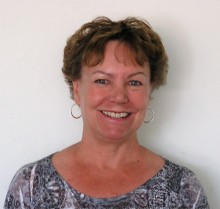 Reviewed by Barb Sherman, LifeForce Yoga Practitioner, Level 2, ERYT 200. Barb weaves LifeForce Yoga breathing practices, mantras and mudras into her yoga classes in Tucson and Oro Valley, AZ. She offers private yoga sessions in her home www.essentialyogaaz.com
Reviewed by Barb Sherman, LifeForce Yoga Practitioner, Level 2, ERYT 200. Barb weaves LifeForce Yoga breathing practices, mantras and mudras into her yoga classes in Tucson and Oro Valley, AZ. She offers private yoga sessions in her home www.essentialyogaaz.com
In this thoughtful, clearly written book Jennie Lee shows us that it is possible to find happiness in this life by following the eight-fold path to yoga outlined by Patanjali in the yoga sutras. Whether you have studied the Sutras extensively, or simply read through them with moments of quiet reflection, you will find something in this book to enrich your understanding. You will learn that by applying these ancient spiritual threads of wisdom to your life you will reap the benefits of self-acceptance, freedom and lasting happiness.
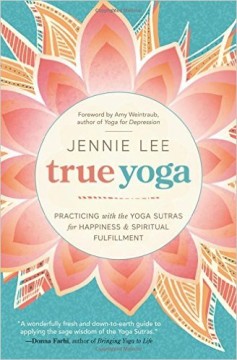 Ms Lee consulted five different translations of the Sutras. From them and from insight based on her own life experience, she wrote True Yoga. In this work she does for the Sutras what Coleman Barks’ translations did for Rumi. She gives these ancient writings an up-to-date rendering that makes them exciting and relevant to our times. For each of the eight limbs she gives practical guides for daily practice. She also poses questions for further reflection and lists affirmations to “post and remember.”
Ms Lee consulted five different translations of the Sutras. From them and from insight based on her own life experience, she wrote True Yoga. In this work she does for the Sutras what Coleman Barks’ translations did for Rumi. She gives these ancient writings an up-to-date rendering that makes them exciting and relevant to our times. For each of the eight limbs she gives practical guides for daily practice. She also poses questions for further reflection and lists affirmations to “post and remember.”
In her treatment of the yamas, the first limb of the eight-fold path, Ms Lee wisely chooses to turn these do-nots of yoga into positives. This makes them broader and more appealing. For example, the first yama, ahimsa, often cited in yoga classes as not-harming, becomes “peacefulness”. By consciously practicing peacefulness we are less likely to harm anyone, including ourselves, and we share our own peace with others. Asteya (not-stealing) becomes “generosity”. This makes it much more compelling moving us beyond the nonchalant first response of, well of course I don’t steal, to a deeper level of giving freely from our hearts, without expecting something in return.
Yoga teachers and students alike will find the chapters on asana (physical postures) and pranayama (breathing practices) particularly meaningful. Most of us know that the physical postures of yoga were never meant to be a stand-alone practice, yet we may not know how to bring that awareness home to ourselves and to our students. Ms Lee helps us get there by encouraging us to observe our inner experience in asana without judgment. She discusses how pranayama, defined as “Control and Expansion of the Life Force”, can change our consciousness and help us to manage our feeling states. One cannot help but draw parallels to Amy Weintraub’s LifeForce Yoga for depression and her emphasis on svadhyaya (self-study without judgment) and breathing practices to manage your moods.
On the last four limbs of yoga Lee’s writing provides deep insight on inward concentration, focused attention, stillness and ultimate bliss. These chapters too include daily practices, questions for reflection, and affirmations. The format of this book gives readers a panorama of practical ways for making these ancient guides to lasting happiness a daily presence in our lives, but it does not make for a quick read.
True Yoga is best-savored slowly one chapter at a time while keeping a notebook or journal.
In the introduction to True Yoga, Jennie Lee asks the question: “What if, no matter what was happening in your life, good or bad, you could answer, Yes! I am happy! Your first response might be, Well, that would be wonderful, but it’s impossible”. In the Epilogue you will find Jennie Lee’s very moving personal story about caring for her mother at the end of her life. Her story may inspire you to weave the threads of the yoga sutras into your own rare and beautiful life. In doing so you just might discover how something that sounds impossible at first, truly is possible.
Book Review: Dancing Mindfulness: A Creative Path to Healing and Transformation by Jamie Marich, Phd, LPCC-S
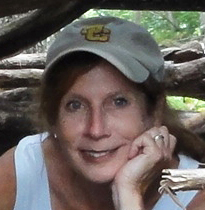 Reviewed by: Dr. Ellen G. Horovitz, ATR-BC, LCAT, E-RYT, LFYP. Ellen has had over thirty-five years of experience with myriad patient populations and is a full professor at Nazareth College, a registered art therapist, yoga teacher and yoga therapist. Author of 7 books, Ellen co-edited the forthcoming Yoga Therapy: Theory and Practice. More information can be found at www.ellenghorovitz.com. Ellen offers workshops, lectures and trainings in art therapy and yoga therapy and is in private practice.
Reviewed by: Dr. Ellen G. Horovitz, ATR-BC, LCAT, E-RYT, LFYP. Ellen has had over thirty-five years of experience with myriad patient populations and is a full professor at Nazareth College, a registered art therapist, yoga teacher and yoga therapist. Author of 7 books, Ellen co-edited the forthcoming Yoga Therapy: Theory and Practice. More information can be found at www.ellenghorovitz.com. Ellen offers workshops, lectures and trainings in art therapy and yoga therapy and is in private practice.
At first blush, I picked up Dancing Mindfulness: A Creative Path to Healing and Transformation and wondered exactly how Marich would spin (pun intended) her pitch on marrying dancing and mindfulness. But as Leo Tolstoy wrote, “Music is the shorthand of emotion”. Inherently, we all know this and in an article in the New York Times, news reporter, Angier1 highlights, “When a musical passage is played, a distinct set of neurons tucked inside a furrow of a listener’s auditory cortex will fire in response.” And this is how I came to music even before I had words for the emotion that music sparked. Taking music and choreographing movement into dance seems a natural outcome.
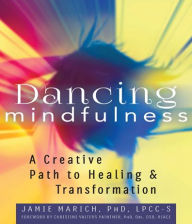 Marich’s suggestion of beginning with at least 3 minutes of silence before beginning a mindfulness based dance practice, thus setting the tempo from within, should not be skipped. Holding center with oneself as a place to begin resonates strongly to yogic-minded teachers and yoga therapists. And adhering to Jon Kabat- Zinn’s2 7 principles (non-judgment; patience; beginner’s mind; non-striving; trust; acceptance and letting go) separates dancing mindfulness from dance therapy, a close cousin to Marich’s work. But most useful are Marich’s ideas (Try This) and her worksheets peppered throughout her book. Here, the book shines as a resource.
Marich’s suggestion of beginning with at least 3 minutes of silence before beginning a mindfulness based dance practice, thus setting the tempo from within, should not be skipped. Holding center with oneself as a place to begin resonates strongly to yogic-minded teachers and yoga therapists. And adhering to Jon Kabat- Zinn’s2 7 principles (non-judgment; patience; beginner’s mind; non-striving; trust; acceptance and letting go) separates dancing mindfulness from dance therapy, a close cousin to Marich’s work. But most useful are Marich’s ideas (Try This) and her worksheets peppered throughout her book. Here, the book shines as a resource.
One criticism with the book is Marich’s continual invocation of God in the source of her Try This exercises and sprinkled throughout the book. There might be some that take offense to such spiritual direction. But moving past that is well worth the read since the ideas and exercises cemented into her edict (dance mindfully and heal through movement) are the centerfold of this work.
1 Angier, N. (2016). New ways into the brain’s music room. New York, NY: New York Times. http://www.nytimes.com/2016/02/09/science/new-ways-into-the-brains-music-room.html?_r=0 February 8, 2016.
2 Kabat-Zinn, J.(2005). Wherever you go, there you are. New York, NY: Hyperbion.
Order a copy of Dancing Mindfulness
News: LifeForce Yoga and Amy presenting at SYTAR
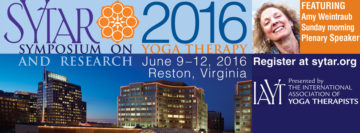
I am excited to be presenting a workshop and plenary talk at the Symposium on Yoga Therapy and Research 2016 in Reston, VA!
Engage with leading yoga therapists, researchers and educators. The conference will foster community connection and growth for the field of yoga therapy and research.
Stop by the LifeForce Yoga table and meet LifeForce Yoga Practitioners who work in medical, mental health and yoga therapy settings.
Register today for the Symposium on Yoga Therapy and Research scheduled for June 9 – 12 in Reston, Virginia. Early birds receive a $100 discount!
 NEWS: LifeForce Yoga at Hollyhock, Canada’s leading retreat center!
NEWS: LifeForce Yoga at Hollyhock, Canada’s leading retreat center!
June 24 – 29, join LifeForce Yoga Mentor and clinical social worker Linda Mackay and Level 2 LifeForce Yoga Practitioner and clinical counselor Ocean Lum to explore yoga practices and Non-dual processes that will help you and those you serve manage anxiety, depression and reduce symptoms of PTSD. You will learn postures, breathwork, mudras, mantras and meditations that balance the emotional and physical bodies. All levels welcome.
Events: Spring & Summer Workshops & Trainings
LifeForce Yoga to Manage Your Mood
Location: Melbourne, Australia
Dates: May 6-7, 2016
Assisting Faculty: Kat Larsen, RYT-200, LFYP-2, Reiki Certified, Chitra Stern (yoga teacher) and Janet Lowndes (Psychologist, Yoga Teacher, Yoga Therapist)
Learn More
LifeForce Yoga Practitioner Training Module A
Location: Melbourne, Australia
Dates: May 6-10, 2016
Assisting Faculty: Kat Larsen, RYT-200, LFYP-2, Reiki Certified, Chitra Stern (yoga teacher) and Janet Lowndes (Psychologist, Yoga Teacher, Yoga Therapist)
Learn More
Healing Anxiety with LifeForce Yoga and IFS
Location: Kripalu – Stockbridge, MA
Dates: May 27-30, 2016
Assisting Faculty: Laura Orth, LICSW, LFYP-2 and Liz Brenner, LICSW, LFYP-2
Learn More
LifeForce Yoga: Live Your Bliss!
Location: Kripalu – Stockbridge, MA
Dates: July 1-3, 2016
Learn More
LifeForce Yoga Practitioner Training Module A
Location: Kripalu – Stockbridge, MA
Dates: July 3-8, 2016
Assisting Faculty: Rose Kress ERYT-500, LFYP-2, LFY Educator, Laura Orth, LICSW, LFYP-2, Kat Larsen, RYT-200, LFYP-2, Reiki Certified
Learn More
Yoga Skills for Therapists
Cape Cod Institute – Eastham, MA
Dates: July 25-29, 2015
Assisting Faculty: Sherry Rubin, LCSW, ERYT-200, LFYP-2
Learn More